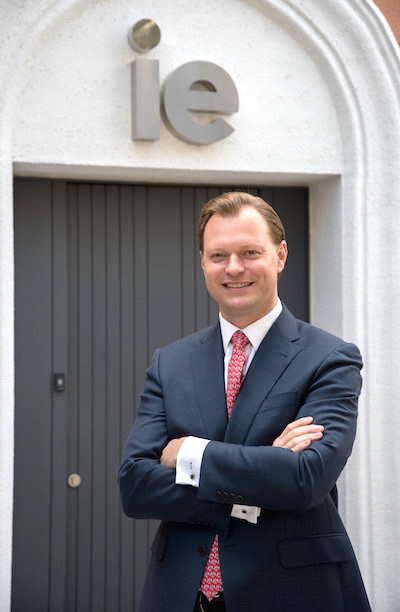APPLICATIONS UP 40% SINCE THE BEGINNING OF THE ACADEMIC YEAR
With its global and entrepreneurial focus in a newly redesigned curriculum, applications to IE’s undergraduate program are up 40% since the beginning of the academic year, says Smelik. Like Weber, applicants want the exposure to a vast array of very different classmates than they would get in most other programs, including IE’s rivals in Europe.
“People do select themselves for this,” adds Smelik. “There is a strong awareness that this is the future and the big problems in the world can only be addressed by global solutions. And employers are looking for this as well.”
Last year, 96% of IE’s undergraduates landed jobs within six months of graduation. The demand for the school’s undergrads is expected to continue. Roughly 40% of the graduates went into consulting, finance and banking jobs. Yet, IE students get a general business degree. There are no concentrations, though. students can choose from a portfolio of electives that would give them deeper expertise in a specific field. “If you were interested in finance,” says Smelik, “you can chose electives in that field to help you get to that position in the market.”
‘IT IS THE INTERNATIONAL SCOPE OF THE PROGRAM THAT MAKES IT UNIQUE’
“The volume demanded by employers for undergraduates is so much larger than it is for graduate programs,” says Martin Boehm, dean of IE Business School. “It is the international scope of the undergraduate program that makes it unique. We do much more with international competitions and bring students together for different partners. When we created the undergraduate curriculum, we looked at the MBA and other graduate programs and brought that stuff in. One of the goals of the undergraduate revision was to ask what employers will need looking ahead.”
IE gives students the option of starting the program in either Madrid or Segovia, where its campus is housed in the Convent of Santa Cruz la Real, a historic building declared a national heritage site. Students who choose Segovia will spend the first two years there and then move to Madrid for the final two years of the program.
‘THE EXPERIENCE HERE IS MORE CENTERED AROUND THE STUDENT’
Wherever they start, students heap praise on the smallness of the classes. “The experience here is more centered around the student,” says Jeannine Saab, 22, who had studied technical engineering in her native country of Columbia before. “Teachers know who you are. I was used to old school professors in big classes.”
Alex Barzelay, a 23-year-old senior, who is British with Lebanese blood in him, agrees. He had grown up in London, went to a school in Lebanon, only to return to the United Kingdom to go to Manchester for a degree. “You are a number and as long as you pass the exams you’re fine,” he says of his experience at Manchester.
Barzelay’s time at Manchester helped him focus on what he really wanted out of an undergraduate program: smaller classes, an entrepreneurial focus, and an international environment. “Interaction with professors actually exists here,” he says. “There is an open communication level here. We are able to have debates in class, and not get lectured to in large classes.”
In his introduction to management course, he recalls students had 12 weeks to come up with a business plan “fresh out of high school and then had to pitch to investors. It was quite intensive. You own it and you have to deliver something.”
‘THE ONLY WAY YOU KNEW SOMEONE WAS FROM A DIFFERENT PLACE WAS BY THEIR ACCENT’
The experience isn’t for everybody, of course. Because there are no dorms, undergraduate students self-organize themselves into small groups and rent nearby apartments. “The IE student can handle it,” says Juliana Pereira, chief of campus life. “The students are so much more mature, and they want to make an impact. Everyone who comes here is a soul searcher,” says Juliana Pereira, chief of campus life. “They celebrate the diversity. That is the real difference here.”
What’s it like to be in a class where you share few cultural attributes with your classmates? Jannik Buddenberg, 22, from Hamburg, Germany, says that as the program unfolds everyone sort of blends in. His core classes had a cohort of 50 students from 35 countries. “At the point where we had been a quarter of the year through, you didn’t even know you had that kind of diversity in the class,” says Buddenberg. “It became a normal thing. The only way you knew someone was from a different place was by their accent.”
At the end of the day, it’s getting to know and learn from classmates who are from every corner of the earth that really seems to resonate with students. Like Weber, Buddenberg has made close friends at IE with classmates from Sweden, Switzerland, Uraguay, and the U.S. He spent last semester in an exchange program at Cornell University and plans to move to New York into a consulting job after his graduation from IE this year. “IE was the only school in Europe I applied to because I was looking for a more international mindset,” he says.
And that’s exactly what he got.













Questions about this article? Email us or leave a comment below.